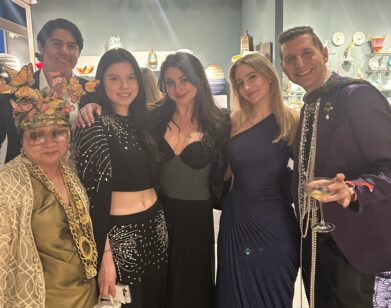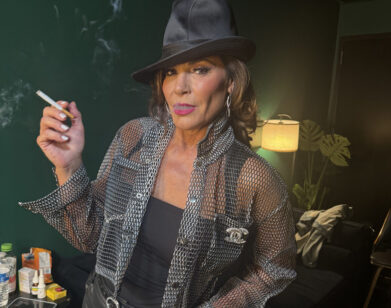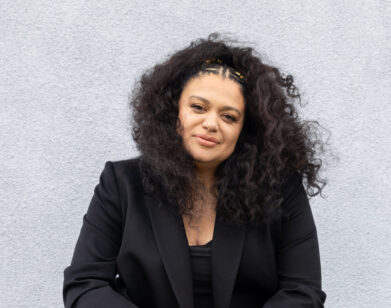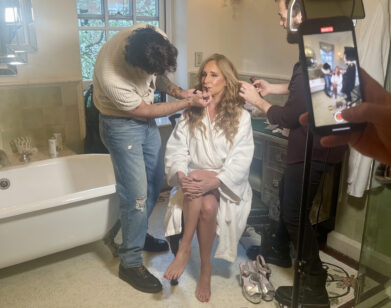big shot
Bethenny Frankel Doesn’t Want To Be Your Girlboss

Bethenny Frankel. Photos by Katya Fevi.
In reality television, sometimes the student becomes the teacher. After getting her start on Martha Stewart’s season of The Apprentice, Bethenny Frankel went on to become one of the most iconic cast members in Real Housewives of New York City history, had two Bravo spin-offs, and appeared as a guest shark on Shark Tank.
Now, the Skinnygirl founder is making all of her own moves on HBO Max’s The Big Shot with Bethenny, where a group of business moguls compete for an executive spot on Frankel’s team. It’s simultaneously a culmination of her previous work and a rebirth for Frankel, as she ascends to the proverbial reality television throne while transitioning into a full-blown brand. In addition to getting engaged to the producer and real estate developer Paul Bernon in March, Frankel has accelerated relief efforts during the pandemic with her charity initiative B Strong, providing PPE directly to hospitals and medical workers around the country. It’s all in a day’s work for Frankel, who, more than 15 years after appearing on The Apprentice, is fully in control of her narrative. Below, she discusses her work ethic, not apologizing for her behavior, the small joys of raising a child, and why the wedding planning is on pause… for now.
———
DANIEL TRAINOR: It’s been such a busy start to 2021 for you. Between launching this show, running a business, getting engaged, and raising a daughter, I imagine it’s been quite hectic. How are you juggling everything?
BETHENNY FRANKEL: Doing a crazy relief effort, too! I’m good in crisis and I’m good when things are a little crazy and insane. During the pandemic, I got very involved in the B Strong relief effort at the beginning. I also realized there was going to be a huge shift in business throughout the world. So, I had to figure out how to lean into it and restructure my whole business. It ended up being perfect that this show came when it did because it was a time to shift and collect yourself. It’s hard to build a rocket ship when you’re flying. It’s hard to make big changes within your staff and in the way you do business while you’re doing business. It slowed everything down, so we were able to recalibrate. It was really great.
TRAINOR: The Big Shot involves more high stakes than your typical reality show, in the sense that the winner isn’t getting a bunch of money or a record deal—you are literally looking for somebody to help run your company. Were you prepared to pull the plug if you got into production and realized that the right person wasn’t there?
FRANKEL: The first day! First of all, we filmed during a pandemic and on Election Day, which was not what I wanted to do or thought the show was going to be. I almost shut it down. I had the courage to be honest with HBO Max. I told them it wasn’t the show that I created in my head and wanted to execute. HBO Max had the confidence in me to say that if we didn’t think we had it, we would shut down. There was an infinite amount of money involved and people sitting around in a hotel, but we were ahead of our skis. So, I said “give me three days.” I got organized, collected myself, and collected the show. I had a big discussion with over 100 people on the crew to explain how I wanted it to go and that we just had to take it one day at a time. I took the reins, 100 percent. In addition, I was absolutely worried about the people. The good news is that it’s my show. I said I could never be locked into any kind of cookie-cutter format. I said if I couldn’t find the person, it would be like at the end of The Bachelor and I wouldn’t marry someone! I’m not doing some fake thing where I never want to see the person again. The show was born from a true need. The need wasn’t born for the show. If you’re talking about Martha Stewart, Trump, or any of these other shows, they create the show and then they plug in a person and a job opportunity. I didn’t do that. I created and produced a show surrounding this opportunity.
TRAINOR: The show is really an amalgamation of a handful of different shows that you have first-hand knowledge of, from Shark Tank to The Apprentice. What lessons did you learn from those experiences that you wanted to incorporate into your own show?
FRANKEL: The funniest thing is that when the show was first announced and everybody was comparing it to The Apprentice, I was sort of annoyed because it’s so different. But I ended up coming around to say, “Okay, the worst thing that could happen is that we have the success of The Apprentice?” I mean, okay. He seems to have done pretty well for himself and the show was successful. I was stupid to get caught up in the ego of that and not want to be compared to anything else. Second of all, the show is very different because these are real products and my real business and my real brands. The Apprentice was integrations with Marquis Jets and Delta Airlines and publishing houses. This is completely original. Out of around fifteen business-competition shows that were ever launched, apparently The Apprentice was the only one that was ever successful. I believe this is the second one. Working with Mark Burnett on The Apprentice, I realized that there’s a military-like way that he produces his shows. The producers didn’t really talk to the applicants. I remember thinking how intense it was. I wanted to recreate that intensity; it was more challenging because we couldn’t have them live together due to COVID, but just the nature of them being away from their families created an intensity during the pandemic. My biggest concern was making it as intense and stressful for them as it was for me.
TRAINOR: You talk about evolving into the Bethenny brand from the Skinnygirl brand. Is that sort of a natural progression of things, or was becoming a multimedia mogul a conscious decision on your part?
FRANKEL: Years ago, I had an agent who said that we needed to be building the Bethenny brand in different categories. I’ve always been aware that Skinnygirl won’t work for everything. Skinnygirl doesn’t work for bedding, it doesn’t work for home, it doesn’t work for fragrance. It’s not for tweens. Bethenny is an elevated woman. We were launching swimwear at HSN and they wanted the swimwear to be under Skinnygirl because it’s a proven, successful brand on HSN. I kept pushing back. It’s a women’s elegant swimwear line, and I don’t want to use the word “Skinnygirl” in swim. It’s an emotional purchase. People get insecure. The brand is for all shapes and all sizes. While shapewear is under Skinnygirl, shapewear is about a solution and making you feel smooth. It can work there. But I needed swimwear to be Bethenny. So, it’s been a natural progression. I want it to be a living, breathing brand besides me.
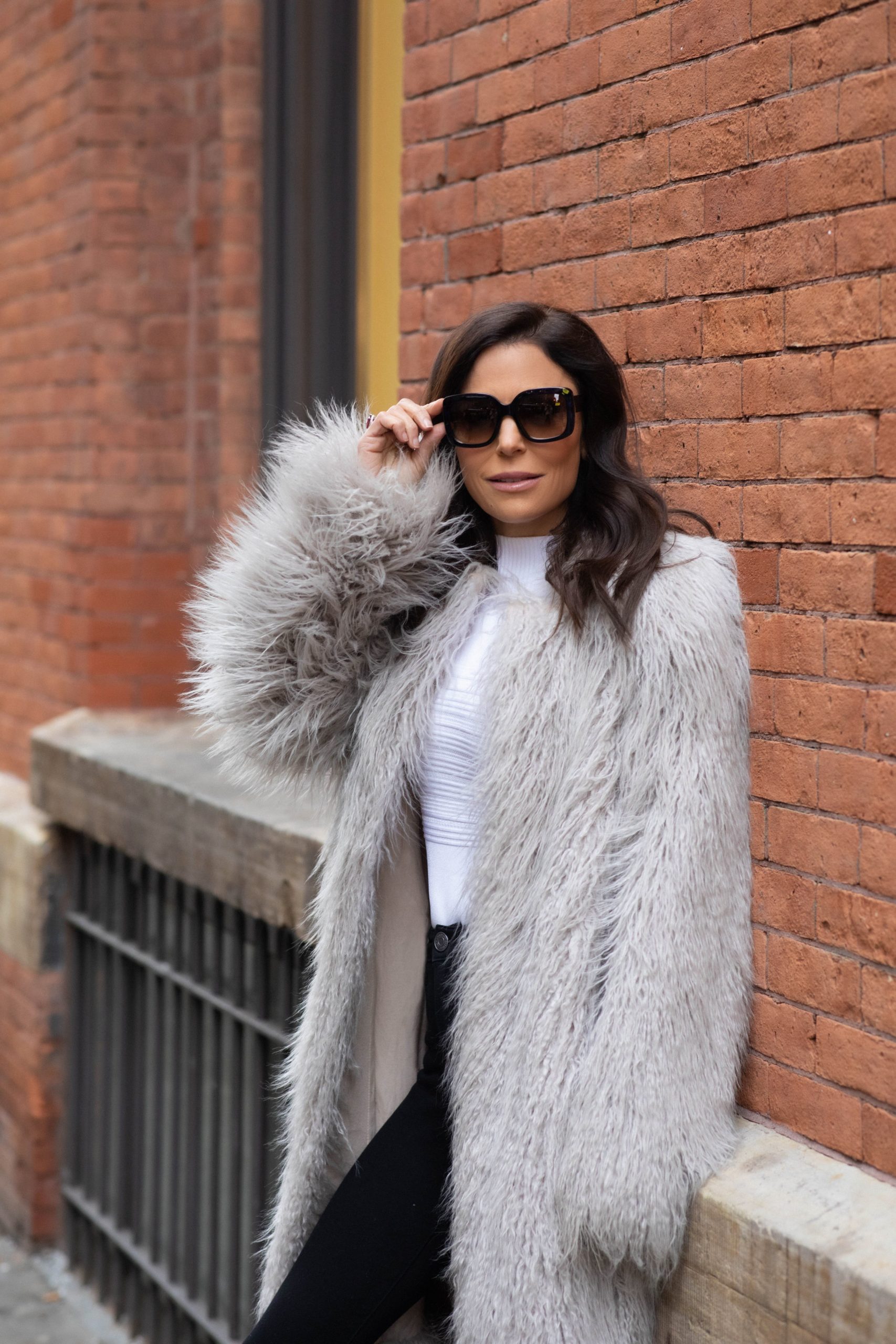
TRAINOR: I think the idea that you need to be some kind of ruthless, hardcore, Miranda Priestley-type in order to succeed has evolved over the years, and the way that many people view powerful, rich CEOs and businesspeople has soured over the past decade. Did you have any concerns about the way you would be perceived on the show?
FRANKEL: Here’s the thing. Did I think about it? Yes. Some people have compared it to The Devil Wears Prada, which I actually like and don’t mind. I’m being totally truthful and I’m not sugarcoating myself. If I learn from it or realize some other practice that I should be doing, then great. But I wasn’t going to sanitize or filter the show the way everything done by every single celebrity is done. Okay? I wasn’t going to do that. I said the same thing I said on Housewives: if I do this, I’m going to be truthful and honest and let’s see what happens. I can take it. I would rather be canceled than sanitized, or be some filtered version of myself. With that being said, I’ve been told that the show, and I agree, is very female-empowering without shoving it down people’s throats. It just happens to be. People ask me about being a woman. I never thought about being a woman. I just thought about me and being strong and pushing through. Maybe it’s being brought up at the race track, maybe it’s just being born tough, I don’t know. I’ve always just pushed through. I went into the business of liquor, which was owned by and marketed to men. Had I thought about it, maybe I wouldn’t have done it. I got into a male-driven business and pushed through. It’s female empowerment without talking about it. Girlboss and boss bitch and all of that stuff is a turn off. It’s just not me. Separately, while Gordon Gekko is a thing of the ‘80s and Miranda Priestley is a thing of the 2000s, Anna Wintour is the biggest HBIC the world has ever seen and Anna Wintour knows how to work 18 hours a day without asking when her lunch break is. When I went on The Apprentice, there’s nothing I wouldn’t have done. That’s a little bit of a throwback, but a little bit of that is missing now. People don’t have that same hunger. Everybody gives a medal for participating now. That’s not really what real business and what real life is like. I didn’t grow up in a generation where you took a picture of yourself in a bathing suit, posted it, and asked everybody “how good do I look?” I’m being the me that made me successful, not the marketed-for-television me.
TRAINOR: What was it like having a young daughter over during the pandemic? I found it difficult to take care of myself, let alone somebody else, so I can only imagine what that was like.
FRANKEL: Well, I do come from a place of yes. You hear a lot of people constantly complaining and constantly whining when there are really people going through serious problems. People who couldn’t get PPE, people in unemployment lines. I’m the person who takes a second to panic, takes a deep breath, and figures out how to tackle whatever the problem is. My daughter doing homeschooling and maybe not learning at the academic level that she would have in school? Well, she learned how to use these kids’ chef knives, make her own lunch, make avocado toast, make parmesan crisps, and make her own pasta! Real pasta, not pouring sauce over pasta.
TRAINOR: Man, this sounds like a great deal for you!
FRANKEL: Right! She also started to eat salad for the first time because of those knives. She started appreciating her food because she’s making it. She also really leaned into her art. She’s an incredible artist. She’s been able to nurture herself by being alone more, getting to know what that feels like. We’ve been so connected. I mean, there are parents of college kids who never thought they would come home. They never thought they’d spend this time with them again. So, while it’s been a challenging time in the country and there were some personal things I went through myself, overall it was a time that I’ll remember for the rest of my life and so will she. I mean, to not have to travel and constantly be packing and unpacking and going and flying and socializing—some people are going through a transition now where they feel a little bit of anxiety. They miss the stillness that we had. I planned a trip for my daughter’s birthday and now I’m saying “I don’t want to go.” I think it’s slowed certain people down.
TRAINOR: I know, I’m feeling many of those same things. As we begin to revisit social gatherings, I keep thinking, “Do I even want to see these people?”
FRANKEL: Yeah! And you won’t need to spend the same amount of money that you used to. There’s a reason that Home Depot stock is through the roof. People are nesting. I got rid of at least a quarter of my wardrobe and a quarter of my personal belongings. I’m not buying clutter. It’s been a real regeneration of self.
TRAINOR: I’m going to get nosy now—has the wedding planning started?
FRANKEL: Truth be told, the wedding planning had started. We had chosen a date. We had talked to someone to help with it. It was great to plan it, but we didn’t want to talk about it 24 hours a day. We didn’t want to think about dresses, who we were inviting, who we’re not inviting, security, and whether there would be paparazzi there. We were wondering if it was weird during a pandemic and if it was superficial to be worrying about things like flowers when people don’t have food. We just decided to table it for a second and breathe. It’s the same thing we were just talking about. Instead of being on the hamster wheel of everything, we decided to just be. I was coming off a divorce that took nine years. We can be committed. We can just… be.

